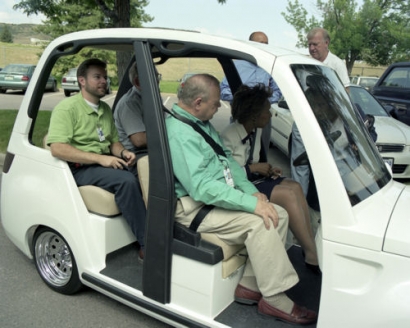
“Now more than ever, we need to work together to create cleaner, healthier, and more equitable communities,” said John Zimmer, co-founder and president, Lyft. “Success breeds success, and if we do this right, it creates a path for others. By adopting our 100% EVs by 2030 commitment and joining EV100, we hope to inspire other rideshare and delivery companies, automakers and rental car companies to make this shift and provide the catalyst for transforming transportation as a whole.”
The shift to 100% electric vehicles (EVs) for Lyft will mean transitioning all vehicles used on the Lyft platform over the next ten years to all-electric or other zero-emission technologies. This includes cars in the Express Drive rental car partner program for rideshare drivers, the consumer rental car program for riders, the autonomous vehicle program, and drivers’ personal cars used on the Lyft platform.
“Switching to electric vehicles is not just good for the planet; it’s good for people – riders, drivers, and the communities they serve. By helping to solve one of the biggest pieces of the climate challenge, we believe we can provide direct economic benefits to rideshare drivers and environmental benefits to communities most heavily impacted by smog and asthma,” the company said.
Switching to EVs will provide direct economic benefits to rideshare drivers because of lower fuel and maintenance costs – an estimated up to $10 billion in savings for drivers from reduced vehicle operating expenses.
Helen Clarkson, CEO of The Climate Group, said, “By working with drivers to electrify more than an estimated 2 million vehicles over the next ten years, Lyft is not only sending a clear signal to policy makers and manufacturers, but will also allow millions of passengers and drivers the chance to experience the benefits of clean transport. A ride-sharing platform such as Lyft making this commitment shows that electric can be the new normal.”
Sam Arons, director of sustainability at Lyft, said, "We're proudly joining EV100 to kick-start our commitment to 100% electric vehicles on the Lyft platform by 2030. The Climate Group's leadership in bringing together these forward-looking companies will help make electric transport the new normal within a decade. As we work to meet our goal, we'll be creating more equitable and healthier communities."
Today’s news is another example of continued corporate commitment to climate action in the current climate. According to new data released today by The Climate Group, 97% of business professionals say their long-term sustainability strategy remains unchanged despite COVID-19 challenges, while 80% say their company has been able to maintain their current climate actions during the crisis.
“As we move to repair the COVID-battered global economy, we have a chance to rebuild better and create a cleaner, more prosperous and more equitable future. Getting there will require investing in clean energy to create jobs and reduce pollution, and radically shifting how we move people and products,” said Fred Krupp, president, Environmental Defense Fund. “Lyft’s commitment accelerates momentum toward this future and sets the standard for other tech and transportation leaders to follow suit.”
EV100 is an initiative by international non-profit The Climate Group, bringing together over 70 forward-looking companies committed to accelerating the transition to electric vehicles (EVs) and making electric transport the new normal by 2030.
Lyft was founded in 2012 and is one of the largest transportation networks in the United States and Canada.

